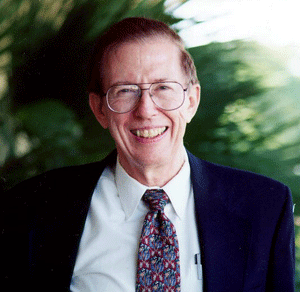Dr. Hugh C. Bailey Inducted Into Pi Gamma Mu Hall of Fame
January 4, 2012
12-3
Jessica Pope
Communications and Media Relations Coordinator
Dr. Hugh C. Bailey Inducted Into Pi Gamma Mu Hall of Fame

|
VALDOSTA -- Valdosta State University President Emeritus Dr.
Hugh C. Bailey was recently inducted into the Pi Gamma Mu Hall of
Fame.
“The Board of Trustees would like to thank you for your dedication
to the Alabama Gamma, South Carolina Lambda, and Georgia Theta
chapters of Pi Gamma Mu and the many students you have inducted
into membership,” Sue Watters, executive director of Pi Gamma Mu,
noted in a letter to Bailey. “Congratulations on receiving this
well-deserved award.”
Pi Gamma Mu is an international honor society dedicated to
encouraging and promoting excellence in the social sciences and to
upholding the ideals of service and scholarship. Bailey became a
member of the organization as an undergraduate student at Samford
University in Alabama. He earned his bachelor’s degree in 1950 and
went on to earn master’s and doctoral degrees in history from the
University of Alabama, in 1951 and 1954, respectively.
Bailey returned to Samford University as a history and political
science instructor in 1953, working his way up the ranks to
assistant professor, associate professor, professor, head of the
Department of History and chairman of the Division of Social
Sciences, and finally, dean of the Howard College of Arts and
Sciences. While there, he became sponsor of the school’s chapter of
Pi Gamma Mu.
In 1967, Bailey joined the Pi Gamma Mu Board of Trustees, serving
initially as vice chancellor and then chancellor of the southeast
region.
Bailey established a chapter of the honor society at Francis Marion
College in South Carolina when he was named vice president of
academic affairs in 1975, and he did the same when he assumed the
role of president of Valdosta State College in 1978.
In 1984, Bailey was named president of Pi Gamma Mu, serving two
three-year terms. Under his leadership, the honor society’s
constitution was revised to make it more democratic, reflecting the
current structure of having individual chapters elect national
officers and regional chancellors. Around this same time, the
decision was made to include two student representatives on the
organization’s board, and the first efforts were made to
computerize the functions of the executive headquarters.
A LOOK BACK AT BAILEY’S 23 YEARS AT VSU
Just as he did as a leader with Pi Gamma Mu, Bailey left behind a
lasting legacy of achievement when he officially retired as
president of VSU on June 30, 2001. (He continued to serve until the
university’s seventh president, Dr. Ronald M. Zaccari, took office
in 2002.)
Bailey facilitated millions of dollars in new construction,
including the new Special Education and Communication Disorders
Building, an addition to the Odum Library, a state-of-the-art
Student Recreation Center, and the Biology/Chemistry Building,
which was formally named the Hugh C. Bailey Science Center in 2006.
Although new construction exceeded more than $60 million during his
tenure, he always said that he would have liked to have done
more.
Under Bailey’s watch, Valdosta State transitioned from college to
university on July 1, 1993. As a regional university, he said VSU
would have a positive impact on the lives of many more students.
Also, academic standards were increased and many new programs were
added, including a master’s in business administration, master’s in
public administration, master’s in social work, doctorate in
education, and master’s in library and information science.
“Education, more than any other factor, is key to economic and
social development,” he was quoted as saying in a special section
published in his honor by The Valdosta Daily Times in June 2001.
“More than any other institution, we are responsible for seeing
that this region of the state receives the education it needs. We
have to be the prime moving force for economic and cultural
development in our region of the state, and if we fulfill that
mission, then this institution should continue to grow and increase
in stature.”
Bailey presided over expanded athletic programs, including a new
P.E. Complex and the establishment of a football team, the
renovation of West Hall and Pound Hall, and the transformation of a
former shopping center into additional learning space, known as the
University Center. He pioneered a long-distance education program
and the expansion of off-site campuses, such as that at Kings Bay
Naval Submarine Base. He was instrumental in making the world of
fine arts available to all of South Georgia and helped establish
the Valdosta Symphony Orchestra in 1990.
At the time of Bailey’s retirement, approximately 8,800 students
from 48 states and 53 countries were seeking higher education in
South Georgia; enrollment doubled during his presidency. He
predicted then that the university’s best days were yet to come as
it continued to emerge as a top-notch regional institution.
In November, VSU’s fall semester enrollment was at
13,089.
Newsroom
- Office of Communications Powell Hall West, Suite 1120
-
Mailing Address
1500 N. Patterson St.
Valdosta, GA 31698 - General VSU Information
- Phone: 229.333.5800
- Office of Communications
- Phone: 229.333.2163
- Phone: 229.333.5983